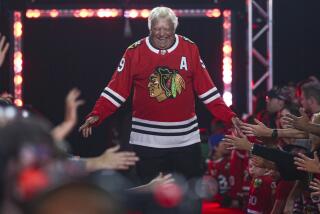Power Play Leaves Gulls Shorthanded : Hockey: San Diego’s goal production is high. The problem is that opponents also are finding it easy to score.
- Share via
SAN DIEGO — All the records in the world lose their luster, and a good measure of significance, when they are scored by a team that consistently ends up on the wrong side of the win-loss column.
With 29 games left in the season, and the team vying for one of eight playoff spots in the 11-team International Hockey League, the San Diego Gulls have the best of both worlds.
The Gulls’ balancing act consists of juggling their success on the power play and their inability to prevent shorthanded goals.
Through 53 games, the Gulls lead the league with 76 power-play goals. That’s an average of 1.43 power-play goals per game. To break the IHL record of 119 set by the Flint (Mich.) Spirits in 1987-88, they would have to score 43 more, an increase of production to 1.48 per game.
On the flip side, they also lead the league in shorthanded goals allowed (16).
“We have to address it,” Gull Coach Mike O’Connell said, “and eliminate it. Any team that consistently gives up that many shorthanded goals isn’t going to consistently win games.”
The operative word is consistently. The Gulls have won games all right, but not the ones that could have lifted them from the middle of the Western Division pack.
Especially exasperating is the Gulls’ recent propensity to give up shorthanded goals, which has made their power-play efficiency seem like no big deal.
“We take a lot of chances,” said defenseman Dave Korol, “so you’re going to have breakdowns. But it evens out. It just seems like in the last four or five games, we’ve lost those games where we’ve allowed a shorthanded goal.”
Against Muskegon, the Gulls allowed a shorthanded goal in Tuesday’s 8-4 loss, then addressed the problem by giving up two goals with the Lumberjacks down a man in the first period of a 8-7 loss Wednesday.
Friday, in a 5-3 loss to Peoria, the Gulls gave up another. It was the Gulls sixth in their last five games.
“We have to get thinking more of defense,” said O’Connell, who also is working with his players on getting better position on the ice. “When you’re on the power play, the tendency not to play the man is greater. You end up playing the puck. It’s like your fishing instead of hunting.”
The loss of center Dennis Holland--the Gulls’ leading goal scorer and director on one of two power-play units--to the American Hockey League’s Adirondack Red Wings on Monday may hamper their scoring ability on power-play opportunities.
“The loss of Holland really hurts us,” O’Connell said. “If he comes back, great, but if not, we can’t be concerned about that.”
Holland, who the Red Wings said would return to San Diego next week, had 22 goals for the Gulls, 10 of those while with a man advantage. Other power-play leaders are Clark Donatelli (9), Larry Floyd (6) and Darren Lowe (10), who scored 53 goals in Flint, Mich., the season the Spirits set the single-season record. Floyd is the Gulls’ points leader.
“I just think when were on the power play, we get it going, and sometimes we forget that we have to play defense,” said Donatelli, who tops the Gulls in goals (17) but has missed the last three games because of a sore knee.
To combat it, Donatelli said the team needs to get back to fundamentals.
“I think it’s more just being aware,” he said, “being able to cut back on turnovers and get back in position. Every team that plays us knows we have two good power-play units, but we’ll score, let them get back in position and score on us. We really have to remember to become defensemen.”
More to Read
Go beyond the scoreboard
Get the latest on L.A.'s teams in the daily Sports Report newsletter.
You may occasionally receive promotional content from the Los Angeles Times.






